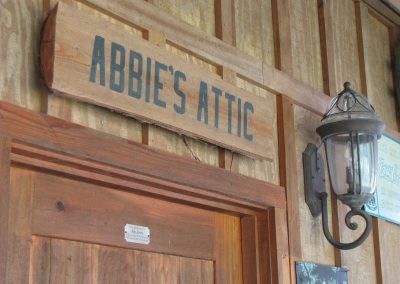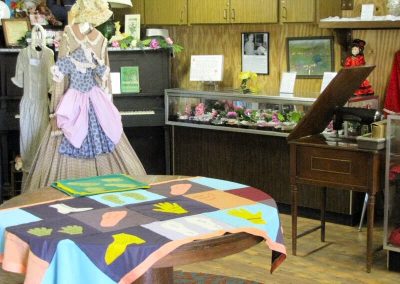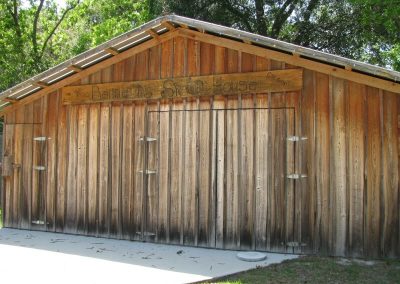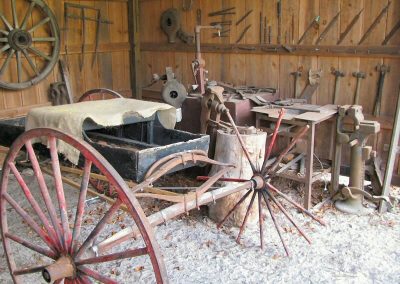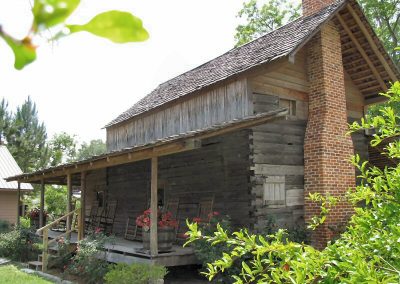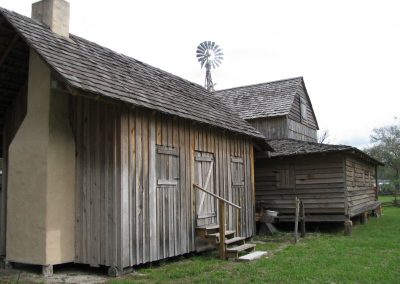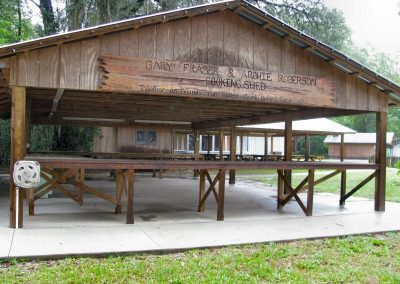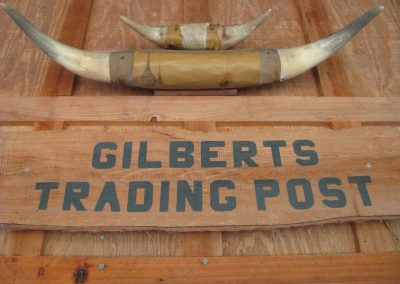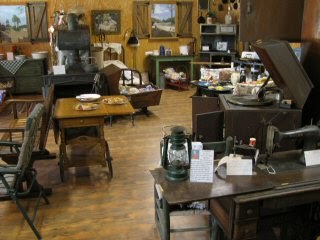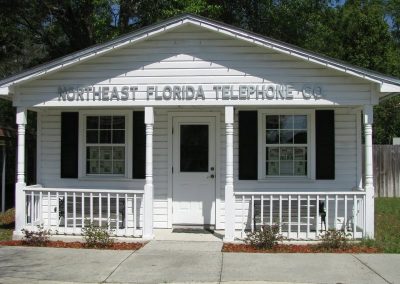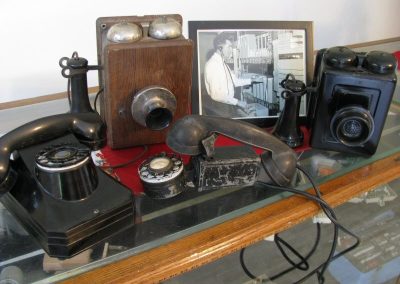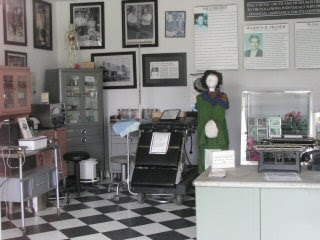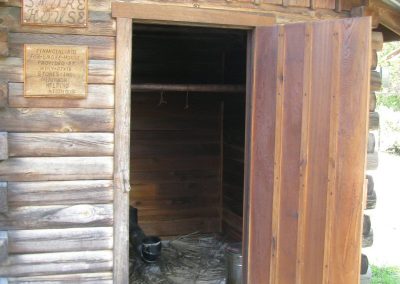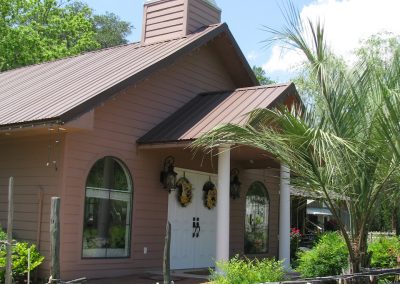Heritage Park Village
Heritage Park offers a unique collection of community history showcasing the lives and traditions of generations from residents of Macclenny and Baker County Florida.
Baker County, established in 1883 in northeast Florida and The City of Macclenny was later incorporated 1885. Macclenny was originally called Darbyville, but the town was later renamed in 1885 for its founder, H.C. Macclenny, who owned large tracts of land in the vicinity. Macclenny and Baker County is an area rich with history and traditions. Many of our area’s current residents are direct descendants of the pioneering families that settled here in the 1800s. The legacy of those families and their traditions can be found in some the exhibits and mini-museums inside Heritage Park Village.
Come and leisurely stroll along the sidewalks that wind past exhibits and mini-museums. Each museum showcases exhibits highlighting this unique slice of Florida community history including the county’s fascinating moonshine era. In the beautifully restored Burnsed Blockhouse, the last of its kind remaining in the state of Florida, get an up close look at the architecture of early pioneer life. Note the rough, hand-hewn timbers, rambling outdoor porches and detached country kitchen with its chimney constructed of moss and mud.
Enjoy a picnic in one of several covered pavilions or relax in the gazebo of the beautifully landscaped Serenity Gardens. Playground equipment is located towards the backside of the park and visitor restrooms are located at near the front of the park next to the depot and caboose. Check out our City’s calendar for information on upcoming events. We are glad you’ve chosen to visit our park and share in our unique heritage.
Heritage Park will usually hosts two main events annually, “Ghost in the Oaks” and “Christmas at Heritage Park”. “Ghost in the Oaks” takes place in October before Halloween and offers a safe family event full of games, contests, and crafts. “Christmas at Heritage Park” takes place early in December and offers safe family fun, a visit from Santa, games, candy, and much more. Heritage Park will also host other events throughout the year so please be sure to check our City’s Calendar.
Abbie's Attic
Abbie’s Attic is named for Abbie Stevens Cook who moved to McClenny in the 1920s and was a primitive artist in the style of Grandma Moses. She loved to work with crafts and samples of her art, crafts and other handwork are showcased.
This museum also depicts the diversity of work of a number of local men and women in the county. Furniture owned by the original McClenny family, a quilt with more than 500 hand-embroidered names, family Bibles and delicate handmade clothing by renowned seamstress Nettie Elizabeth Rowe, born in 1887, are included.
Baker County Community School
The Baker County Community School honors the contributions of the many teachers and administrators who devoted and continue to devote their careers the education of the county’s youth. Photographs, autograph books, music and reading books and other memorablia are on display.
The exhibit features a wonderful mural of the old Macclenny High School by local artist Carol Baker and also contains a large chest that functions as a time capsule housing a variety of information documenting the county’s history.
Barber Shop
Within the barber shop visitors can view the original barber bench, coat rack, scissors and barber tools. Donated historic barber chairs are on display as well. Shoe shine boys once plied their trade on the street just outside of the shop. The shoe shine stand currently seen was custom crafted by 6th generation Baker County carpenter, Ray Jones and features hand-carved names of local men who once served the community as shoe shine boys.
Over the decades Baker County had its share of barbers, hair stylists and shoe shine boys. One of the most popular barber shops was owned by Lautice Dugger and operated for more than forty years on Main Street near the corner of Fifth Street. Serving as a social hub for news, men gathered there for a shave, haircut and sometimes a hot Saturday night bath, hence the shower located in the rear of the exhibit.
Bennett's Syrup House
Back in the day, local moonshiners relied on availability of syrup as an ingredient in their brew when white granulated sugar was scarce or too expensive. Inside the syrup house can also be seen the 200 year old hand-hewn wash log used for generations by the Isaiah and Bertha Mae Harris family for doing laundry.
Those attending get a taste of the freshly pressed cane juice before skilled workers transform it into the dark amber syrup that was a common sweetener and food source for the county’s early residents.
This rustic barn is the site of one of Baker County’s indigenous traditions – grinding sugar cane to boil the sweet juice into syrup.
During the fall and spring Heritage Days Festival, Baker County native Bennie Joe Bennett, who helped sponsor and construct the exhibit, including donation of an 80 gallon syrup boiler, treats visitors to syrup boiling demonstrations.
Blacksmith Shop
The tools displayed in our blacksmith shop exhibit have been donated by former Macclenny city councilman, Mr. B. J. Cannon, an avid restorer of antique cars.
When country folk suffered from a bad tooth, likely it was the blacksmith they went to see for relief. The blacksmith often served as the local veterinarian as well.
Rural communities almost always had a blacksmith shop for crafting hardware such as nails, hinges and wheel rims.
Their services to farming families were vital for mending horse shoes and repairing broken wagon parts.
Blue Haven Restaurant
The Blue Haven opened in 1947on Hwy 90 in Macclenny and was the county’s first drive-in restaurant. Owners Suzie and William Barber, Sr., also ran a boarding house next door. The restaurant was a popular hangout for teenagers in the 1950s where they gathered daily after school to eat cheeseburgers, drink cokes and listen to music on the jukebox.
Displayed inside The Blue Haven exhibit are napkins scribbled with messages from some of the original patrons as well as chairs, a table, a booth and even the bright red Coca Cola drink cooler that were all once part of the restaurant.
Frequent Blue Haven customers from that time are immortalized by a drawing done by local artist and historian, the late Gene Barber. Also on display is a framed photo of the county’s first All American football player, Larry Dupree, who signed his professional football contract at one of the Blue Haven tables at midnight. The restaurant closed in the late 1960s.
Burnsed Blockhouse
James Burnside (Burnsed), born 1817, is credited with building what today is known as the Burnsed Block House. This structure is the last example of original block house architecture remaining in Florida.
One of a series of block house structures, it was constructed across the north Florida frontier by order of then Governor Andrew Jackson. Block houses acted as protective fortresses for settlers against raiding parties of Seminole Indians who were on the war path across Florida at that time.
Early in its history, the house was purchased by James Hugh Brown. His descendants, including Coll Brown for whom the house became known, occupied it for many generations.
Rescued from ruin and decay, the house was moved and restored and today stands as a unique testimony to the pioneer men and women whose rugged and determined spirit helped pave the way for generations of future Floridians.
Darbyville Jail
Among the jail’s historic photographs and mementos is a signed confession of two men convicted in the murder of a farm couple which preceded the last official hanging recorded in the state of Florida.
The Darbyville Jail exhibit honors all of Baker County’s law enforcement officers and particularly the memory of county sheriff Joe Newmans.
It was built by businessman W. W. Bill Gay, a major patron of Heritage Park and former employer of Mr. Newmans.
Davis Oil Company
Established in 1931 by R. H. Davis, the Davis Oil Company was a one man, one truck hauling service for Sinclair Oil Company. The company trucks originally hauled gas and kerosene in 55 gallon drums to serve homes and farms throughout the county.
Davis Oil Company has been owned and operated by three generations of the same family.
Today, it employs more than one hundred workers.
Fraser-Roberson Cooking Shelter
The sink in the shelter came from a local historic house.
The shelter is dedicated to and named for Gary Fraser and Archie Roberson, life-long friends who devoted more than 35 years to cooking and preparing food for county special events and benevolent services.
Heritage Park Village’s cooking shelter is utilized to cook and serve food at special events such as the park’s annual Heritage Days celebration.
Gilbert's Trading Post
Opening in 1933, Gilbert’s Trading Post supplied Baker County residents with general supplies including paint, lumber, hardware, fertilizer and used furniture. Local moonshiners brought their glass jars and corks there as well.
An entrepreneur, Mr. Will Gilbert engaged in such enterprises as a successful house moving company and under government contract, constructed outhouses throughout the county to help combat the hookworm that plagued the rural families at that time.
The Trading Post exhibit showcases many eras of the county’s development and includes collections of objects belonging to local residents which are displayed along with personal histories.
Knabb Family Turpentine
The display, which explains the phases of turpentine production, was constructed by Knabb offspring to honor their family’s contribution to Baker County’s growth and development.
Knabb Turpentine was once the largest turpentine operation of its kind in the United States.
At one time the Knabb family worked 50,000 acres of slash pine, planting an average of one half million seedlings per season.
McClenny Train Depot
When the Seaboard Railroad announced the demolition of the historic Mcclenny Train Depot in 1986, Baker County citizens banded together and raised funds to relocate it to property that eventually became Heritage Park Village.
Today, the depot, originally built in 1924, has been restored and serves as a fascinating archive of local history including items honoring descendants of the original McClenny family and the Conova family, direct relatives of the famous radio comedian Judy Conova who lived in the Baker County community of Sanderson.
Nefcom Telephone Company
Phone service to Baker County was established just before the onset of WWI in the early 1900s by George M. Clayton. It was then known as The Macclenny Telephone Company and ushered in an era of technology never imagined by members of small, rural Baker County.
In the mid 1970s owner Gladys Walker guided the company in numerous improvements and upgrades including the installation of new digital central office facilities which ultimately embraced internet, long distance, business system sales, installation and maintenance.
This museum houses examples of the evolution in telephone equipment and service. Among the items on display is the Stromberg-Carlson Switchboard which was used to connect local calls during the mid 1960s – 1970s; the Western Electric “Hang Up” hand set, circa 1930s and many more.
Outdoor Moonshine Still
During the early decades of the 20th century, many of Baker County’s rural residents manufactured illicit whiskey to make extra money. In many cases, it was a family’s only source of income. The trade ultimately grew to be such a major industry, Baker County became known as the Moonshine Capitol of the South.
By the 1960s, the practice had become so corrupt many county citizens banded together to elect and support a new law enforcement program to rid the area of the ‘stigma’ of moonshine. Today, few are aware of the major role the industry played in the county’s past.
Paul's Rexal Drugs
The museum contains items that chronicle the county’s medical history from the yellow fever epidemic in the late 1880s to local midwives, physicians and nurses to the development of the health department and establishment of the local hospital. Dr. Watson’s original appointment books, some prescriptions and medical records and his personal book of cure-all home remedies are among the collection.
Paul’s Rexal continued operating in Macclenny until 1993.
He also encouraged the young Mr. Rhoden to attend pharmacy school at the University of Florida in Gainesville.
During the 1940’s, Macclenny’s first full time physician, Dr. John Watson suggested to Paul Rhoden that he convert his sundry store into an official drug store to provide prescriptions locally.
Serenity Gardens
One section specifically honors veterans of the Korean and Vietnam wars. Wind chimes placed high among the tree branches fill the air with a pleasant resonance which calms and soothes, hence the name – serenity.
Serenity Gardens, set on a quarter acre of park grounds near the main entrance was established for the county’s residents to remember and honor their ancestors. The gardens feature a walkway that meanders through a stand of large shady pecan trees, roses, daylillies, palms and Japanese plum trees.
Benches that circle the central gazebo bear engraved mini sketches of facts about Baker County citizens. A large military monument holds the engraved names of all known local enlisted men and women who died during their military service.
Smokehouse
Pioneering farmers built wood smoke houses for drying and preserving their butchered meat. These structures came in different sizes, usually had a sandy floor and hooks in the ceiling for hanging hams and other types of meat during the slow curing process.
Smoked meat has a long shelf life, sustained farmers and their families from one season to the next and was especially critical to help people survive during hard times.
Wayne and Catherine B. Reynolds Village Chapel
The Reynolds Chapel has become a hallmark site in Heritage Park Village where weddings, music programs and other special gatherings occur.
Her mother, June Brescia, today resides in Macclenny and was involved with the chapel’s design, interior decor and landscaping. Other family members also donated funds and materials to the chapel’s completion. The altar area is known for its large picture window looking out over a stately wooden cross in the back garden.
Catherine B. Reynolds of the Catherine B. Reynolds Foundation in Washington, D.C., donated funds to build a chapel in Heritage Park Village.
Reared in Jacksonville, Ms. Reynolds often spent summer vacations in Baker County with cousins, aunts and uncles.
Wilma's Millenary Shoppe
The Millenary Shoppe showcases much of what she collected and features the many hats she was fond of wearing.
Her zest for family and life manifested through her passions as an artist, seamstress, English teacher, community leader and collector.
The Millenary Shop is an exhibit that showcases the collecting passion of one of Macclenny’s most unique ladies, Wilma Cook Morris.
Heritage Park Hours:
Daily 7AM – 9PM
Excludes Special Event!
(See City Calendar)

